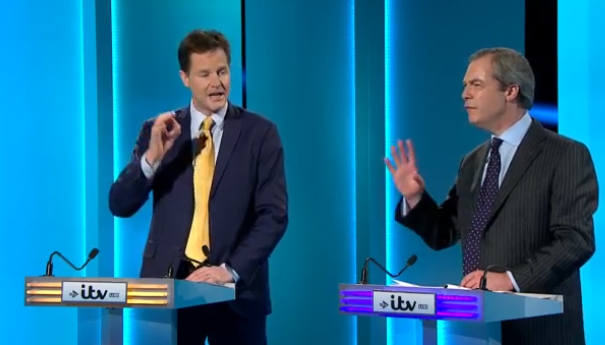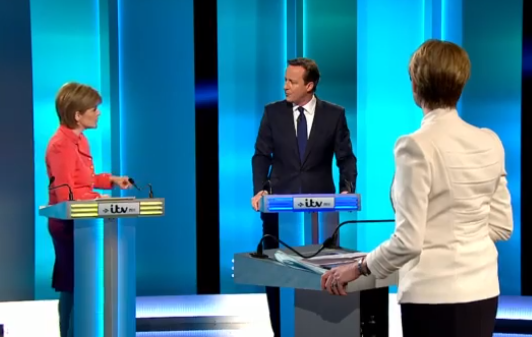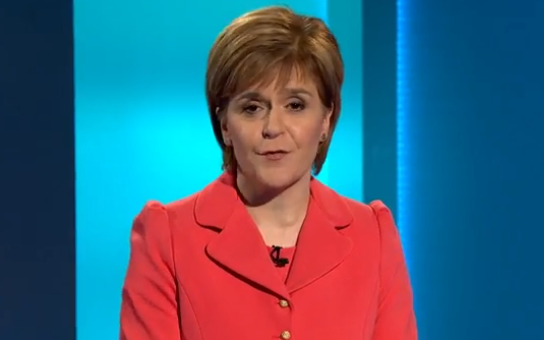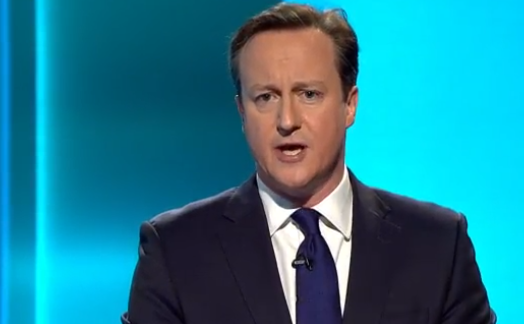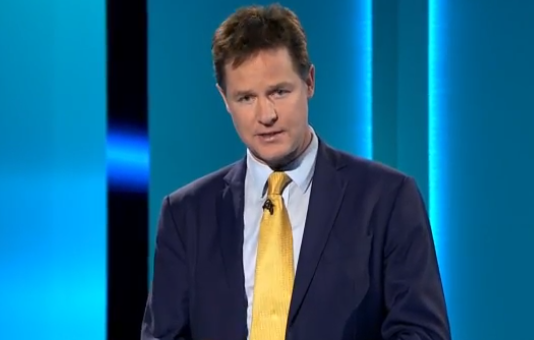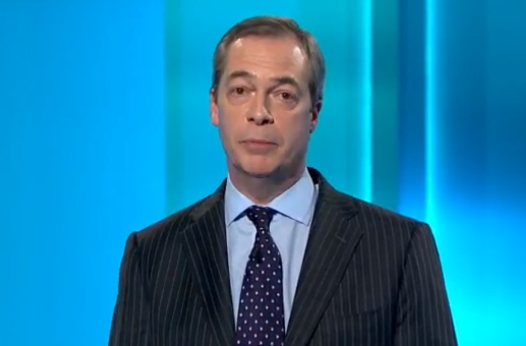9:57: Obviously, it’s hard to ‘keep score’ of ‘winners’ and ‘losers’ in a seven-way debate. Bennett seemed largely invisible and, aside from the dust-up over immigration, so was Farage, who tried to turn every other question into an opportunity to discuss the European Union and immigration.
Wood and Sturgeon had strong nights, and their attacks on Cameron often made the Labour case better than Miliband’s arguments. Sturgeon, in particular, will have benefited from airing Scottish grievances directly to a British prime minister for the first time in a leader’s debate.
Clegg tried, sometimes successfully, to position himself as a sensible moderate. He also successfully signaled that he could work with a Labour government as well as a Tory one.
Miliband was most successful, I thought, in his criticisms of Cameron’s EU policy and his plans for the NHS. But he didn’t have any clear moments where anyone could say, ‘Aha, there’s the next prime minister of the United Kingdom of Great Britain and Northern Ireland.’ He came across as a thoughtful, earnest opposition leader.
Which brings us to Cameron. He’s a skillful debater, and he knew when to attack (against Miliband), when to hold back (against Clegg), and he quite cleverly triangulated Miliband against Farage. The format clearly helped to make Cameron look ‘more like a prime minister,’ even at the expense of having to stand mutely listening to a lecture from the Scottish first minister. Nevertheless, it’s not clear why Cameron is so scared of a direct face-off against Miliband.
9:56: Farage, as usual, remains very entertaining in his closing statement. See? I told you they were all the same!
9:54: Bennett makes a hard-to-believe case that a vote for the Greens will matter.
9:53: Miliband talks about ‘if’ he’s prime minister, not ‘when’ he’s prime minister. That underlines, in a concrete way, a lot of the inchoate doubts about his personality.
9:52: Clegg’s closing argument — ‘don’t lurch’ one way or another. ‘The only way we can do that…,’ he implicates, is by keeping the LibDems in power as the coalition kingmaker.
9:49: Cameron gets a quip in about 70 Labour MPs who use ‘zero-hour contracts’ that Miliband argues he would eliminate.
9:46: Impromptu question from an audience member about the treatment of returning veterans, and Cameron handles it very well and very graciously.
9:42: One of Farage’s advisers certainly believe it’s advantageous for him to mention in every answer that the United Kingdom has to build one house every seven seconds to keep up with the wave of foreign migrants. It’s the third time, by my count.
9:40: First mention of Tony Blair, when Sturgeon tries to tie Miliband to Blair for introducing tuition fees and Clegg for backtracking on his promise not to let the Tories raise tuition fees.
9:38: We’re back to the first question — Miliband and Cameron are now sniping about banks and regulation and who’s to blame for the economy.
9:36: Even when Clegg goes after Cameron, the prime minister holds back. It’s a smart move, because Cameron knows that bickering with his coalition partner can only make him look smaller. So he’ll demur and talk about ‘sitting in the cabinet room’ hashing out policy with Clegg for the past five years. Very sharp.
9:34: Farage’s answer on education is the most entertaining, and he claims that ‘the rich’ are the only ones having a great time in the United Kingdom. He’s arguing about inequality, and he’s lamenting the fact that the rich who can afford the best schools dominate politics, the media and other industries.
9:27: What’s so interesting about the debate on immigration in the United Kingdom is that it lies primarily over the question of migrants from EU countries — that’s much different than the tone of the debate in Denmark, The Netherlands, France and Scandinavia, where the much darker debate revolves around African and Middle Eastern immigrants, primarily those who are Muslim. It’s an important distinction.
9:25: Farage argues that letting in so many eastern European countries with incomes so much lower is the problematic aspect of open migration — it’s not a problem when the European Union includes countries just like France and The Netherlands.
9:24: Wood says she agrees that Farage is right when he says that the United Kingdom can’t really control immigration policy when it’s part of the European Union.
9:22: Clegg adds that Farage thinks that every problem can be solved by leaving the European Union. Argues that UK unemployment would go up if the country voluntarily leaves a market of 400 million consumers. ‘Deeply irresponsible.’
9:22: Miliband adds that Cameron doesn’t even want to take the United Kingdom out of the European Union, it’s a waste of resources and there are higher priorities.
9:20: Sturegon says Cameron is pandering to Farage and that Cameron’s promise of an ‘in-out’ 2017 referendum takes the United Kingdom dangerously close to leaving the European Union.
9:18: Clegg says the answer is to raise the minimum wage, and we see a spirited re-run of the debates last year between Clegg and Farage, who returns to his claim that Clegg isn’t telling the truth that, while the United Kingdom is a member of the European Union, the country can’t do anything about immigration.
9:16: Farage gives us a lecture on immigration history, argues that UK immigration is 10 times higher than at any time since World War II, which has lowered wages.
9:15: Again, Sturgeon gets to lecture Cameron as he stands silent, in this case for acting like a ‘petulant schoolboy’ with respect to EU membership renegotiation.
9:12: Miliband tweaks Cameron for his failed push to prevent Jean-Claude Juncker as European Commission president.
9:12: Cameron says a vote for Farage is a ‘back door to a Labour government, which would give us an open door to immigration’
9:11: Farage retorts that ‘Mrs. Merkel, who is the real boss in Europe, as we know,’ has made it clear that open borders in the European Union is not up for discussion. He’s probably right — it’s a bedrock principle of the open market as it exists today in the European Union.
9:10: Some smart triangulation by Cameron when he argues Farage says there’s nothing to be done, ‘so just give up and leave,’ Miliband says nothing can be negotiated at all, ‘so just give up.’ Not quite true, arguably, but smart politics. It’s why Cameron is winning this debate tonight.
9:09: Bennett says we should celebrate the open boundaries of the European Union, and she says that UK should be taking in even more refugees.
9:08: Clegg says, ‘I’ll never spread fear’ about immigration. ‘I want Britain to be open for business, not open for abuse.’
9:07: Farage sounds over-caffeinated when he attacks on immigration, argues that as EU members, the United Kingdom can’t do anything about ‘open door’ to ‘ten former Communist countries’ and depressed eurozone.
9:05: Wood and Sturgeon attack UKIP for scapegoating immigrants. Sturgeon says Westminster parties aren’t being rational, succumbing to Farage’s populism. Argues that migrants are net contributors. Make sure it’s a ‘decent and civilized’ debate, not one driven by Farage.
9:03: Miliband makes it clear he’ll tweak immigration, but he won’t play to Farage’s anti-foreigner attacks: ‘If you want a prime minister who will cut Britain off from the rest of the world, that’s not me.’
8:59: We’re halfway through this debate, the only one to feature Cameron and Miliband on the same stage, and no one has mentioned the names of Margaret Thatcher, Tony Blair or Gordon Brown. It’s amazing. Can you imagine the 2016 presidential debates without a single mention of Ronald Reagan, Bill Clinton or George W. Bush?
8:58: And that’s the end of the first half. The debate will turn away from NHS and to immigration, an area that most people believes should advantage Farage.
8:57: Miliband is animated as he defends the last Labour government’s record of cutting wait times ‘from 18 months to 18 weeks.’ He claims the NHS is going backwards under Cameron. ‘They believed you, they believed you were a different kind of Conservative.’ Easily his best moment of the night, and it’s one reason why it’s strategically wise for Miliband to pick this fight over the NHS.
8:52: Sturgeon also takes down Farage — ‘my instinct, when someone is diagnosed with HIV, is to consider them a human being, not about which country they come from.’
8:51: Wood takes the bait, says Farage should be ashamed of himself and that he’s dangerously perpetuating stigma.
8:50: Farage now attacks everyone again for brushing him aside because his points are ‘politically correct.’ Now he’s pointing out that 60% of HIV-positive patients in the United Kingdom come from outside the United Kingdom. He realizes he’s not getting traction.
8:49: Clegg and Sturgeon are now fighting over whether the Tory/LibDem government have actually privatised elements of the NHS.
8:47: Wood takes aim at Labour for beginning the process of privatisation of the NHS in Wales. Miliband tries to deflect that, then goes after Cameron. One of the things that strikes me about this debate so far is that Sturgeon/Wood have been much more effective attacking Miliband (and Cameron) from the left than Farage has been in attacking Cameron from the right.
8:43: Farage starts talking about the NHS as a ‘health tourism’ scheme. On every question, he’s trying to turn the debate to immigration and EU matters. It’s not working, none of the other six leaders are taking the bait, and it reminds me of the time that US vice president Joe Biden once remarked that former New York mayor Rudy Giuliani only knew one way to structure sentences: ‘a noun, a verb and 9/11.’ With Farage, it’s ‘a noun, a verb and foreign workers.’
8:42: Cameron’s response is great — he speaks from personal experience about the importance of the NHS, and he makes a strong case for making the NHS a seven-day-a-week
8:40: Here comes Miliband, who’s making a very strong case that waits are too long to see doctors and who outlines all of the gripes you typically hear about the NHS. His solution is clear, he says — a mansion tax on homes over £2 million, a tax on hedge funds and taxes on tobacco companies.
8:38: Clegg says the NHS needs £8 billion over the next decade, arguing that the Conservatives can’t do it because they won’t raise taxes, and Labour won’t do it because they’re too profligate on spending. It’s an interesting tack, because you can see that Clegg is trying the same triangulation that worked so well for him in 2010, and he’s also creating the space to support either party in government.
8:36: What’s most interesting is that while Sturgeon, Bennett and Wood continue to hammer the Tories on austerity and the economy, Miliband has since last year increasingly attacked Cameron on the National Health Service.
8:33: Farage takes the debate in a new turn back to the European Union and against foreign aid, but it feels forced. If this election is about anything, it’s increasingly becoming less about the country’s EU membership, and that bodes poorly for UKIP and Farage.
8:32: Sturgeon’s advantage in this debate is that she is standing directly beside Cameron. It’s the first time that a Scottish first minister has stood shoulder to shoulder with a sitting prime minister to challenge austerity, and I have to believe it will play very very well among Scottish voters.
8:27: Farage: ‘You’re right, the Welsh negotiated a very bad deal in 1978.’ He also says that the Scots get too much money from Westminster. This must be the debate that so many British unionists have dreaded for decades — Farage is demanding less money for Scotland, a Welsh leader is demanding more money for Wales, and Sturgeon is hitting back at Farage. Not a great moment for the British union.
8:24: The first real dust-up between Miliband and Cameron comes over which past was worse for the country, and perhaps that’s the question for the election. Miliband’s argument is that the budget cuts of the past five years have been needlessly painful, Cameron’s argument is that, increasingly under the prior Labour government, government spending was out of control.
8:22: It’s a small point, but I cringed when Clegg used the term ‘Scot-free’ in this debate. If there’s anything to say about this election and this debate, it’s not Scot-free.
8:21: Farage is well-informed, and he sounds very competent. He’s attacking Cameron from the right by not cutting the budget enough, arguing that the UK debt burden is still too high.
8:20: After the Clegg-Cameron dustup, Sturgeon makes the easy point that the two have been ‘hand in glove’ on austerity over the past five years. She’s also making the case that the country’s spending needs to rise to spend more money over the next five years.
8:17: Clegg’s first question goes to Cameron, and it’s a tough one about the balance between budget-cutting and raising taxes. Clegg is arguing that wealthier Britons need to pay more money. It’s a staggering choice on Clegg’s part, and he’s keen to draw a contrast with the prime minister he’s served for the past five years.
8:13: Leonne Wood, the Welsh nationalist leader, is making the most strident case of any of the seven leaders against austerity — even more so than Miliband. Her line about ‘so much pain for so little gain’ is perhaps the best line so far.
8:12: What’s striking is that both Miliband and Cameron are making the case that ‘it doesn’t have to be as bad’ as it was under the other guy. It’s the same argument.
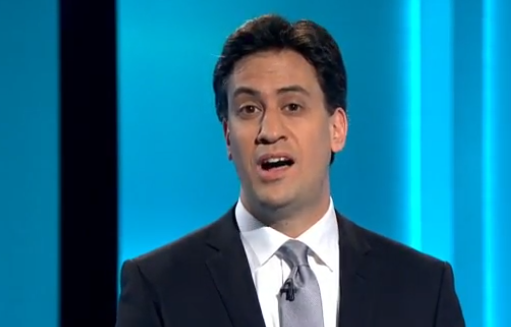
8:09: Ed Miliband makes his case on the basis that Labour will raise the minimum wage, ban zero-hours contracts, hire more doctors and nurses, arguing in essence that he can do all this and still balance the budget.
8:07: David Cameron takes a victory lap for the economy’s performance, and argues that ‘debt, taxes, borrowing and spending’ of the past would take Britain back to ‘square one.’
8:05: Nicola Sturgeon makes a play to all UK voters that the SNP can help give the United Kingdom a progressive government.
8:05: Nick Clegg admits he’s made mistakes, and he makes it clear that the LibDems are playing to be the kingmakers for the next government.
8:05: Nigel Farage strikes out early by tying the other six leaders on stage for their support for EU membership and increased immigration. A much more targeted, concise introduction than Bennett’s.
8:04: Nigel Farage strikes out early by tying the other six leaders on stage for their support for EU membership and increased immigration. A much more targeted, concise introduction than Bennett’s.
8:04: Natalie Bennett, the leader of the Greens, gets the first chance to speak, and she makes a standard case for a more leftist Britain.
* * * * *
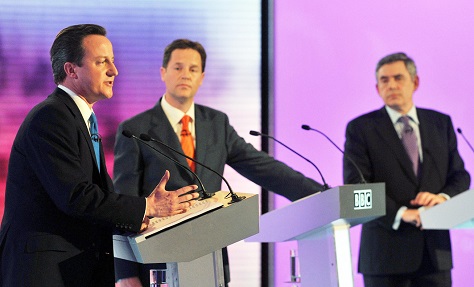 With 34 days to go until the British general election, Suffragio will be live-blogging the debate, which begins tonight at 8 pm GMT (3 pm ET) among the seven (!) leaders of the political parties contesting the election:
With 34 days to go until the British general election, Suffragio will be live-blogging the debate, which begins tonight at 8 pm GMT (3 pm ET) among the seven (!) leaders of the political parties contesting the election:![]()
- prime minister David Cameron of the center-right Conservative Party;
- opposition leader Ed Miliband of the center-left Labour Party;
- deputy prime minister Nick Clegg of the Liberal Democrats, the junior partner in the current Conservative-led government;
- Nigel Farage, the leader of the eurosceptic United Kingdom Independence Party (UKIP);
- Scottish first minister Nicola Sturgeon of the pro-independence Scottish Nationalist Party (SNP) and a social democrat who might eventually end up propping up a broad Labour-led government;
- Natalie Bennett, the Australian-born leader of the left-leaning British Green Party; and
- Leanne Wood, the leader of the Welsh nationalist Plaid Cymru, a socialist and a republican with strong ties to Sturgeon and the SNP.
At this rate, it’s almost a surprise that Northern Irish leaders weren’t invited to the stage.
Unlike in the United States, there’s not a lengthy tradition of televised debates prior to general elections (and even in the United States, presidential contenders have faced off consistently only since 1976). Cameron joined Clegg and former prime minister Gordon Brown (pictured above) in televised debate only for the first time in 2010. The debates were a smash hit — and Clegg emerged as the winner, rising above what viewers saw as the ideological squabbling between Cameron and Clegg. For a time, at least, it catapulted the Liberal Democrats into first place in polls. For Cameron, the LibDem surge meant that the Tories ultimately fell short of a majority when the Clegg’s party still won 23% of the vote and 57 seats in the House of Commons.
All of the challengers, including Clegg, are hoping to recapture the kind of breakthrough performance today that Clegg had in 2010 — and that’s especially true for Farage and Wood. Both UKIP (mostly on the right) and the Greens (on the left) have won historically high support in polls leading up to the election. As voters, however, focus on a race that’s essentially tied between the Tories and Labour, polls show that voters are migrating back to the main parties. For Sturgeon and Wood, it will be enough to reassure their respective voters in Scotland and Wales. Sturgeon, in particular, seems likely to win between 40 and 50 (or more) of Scotland’s 59 seats as traditional Scottish Labour supporters migrate en masse to Sturgeon’s SNP.
It’s the only debate — so far — that Cameron has agreed to contest, and the seven-way debate format is designed in part to make Cameron look like a statesman on a stage of hard-right, hard-left and regional nationalist pretenders, depriving Miliband of a one-on-one showdown between the only two leaders that have a realistic chance of becoming prime minister after the election.
Today’s Guardian poll-based projection shows that Cameron’s Tories would win 276 seats and Labour would win 270. The SNP would win 50 seats (all in Scotland), and the Liberal Democrats would lose nearly half of their seats, dropping to 28. UKIP would win just four and the Greens just one, with 21 additional seats going to independents, Plaid Cymru and including 18 seats in Northern Ireland, where different parties compete from the major British parties.
On those numbers, neither the Tories nor Labour — even with the support of Clegg’s LibDems — would be able to amass a majority government of 325 MPs. That’s led to renewed speculation that Labour will be forced to join forces with the SNP, a potentially toxic combination, given the animosity between the SNP and Labour in Scottish regional government.

